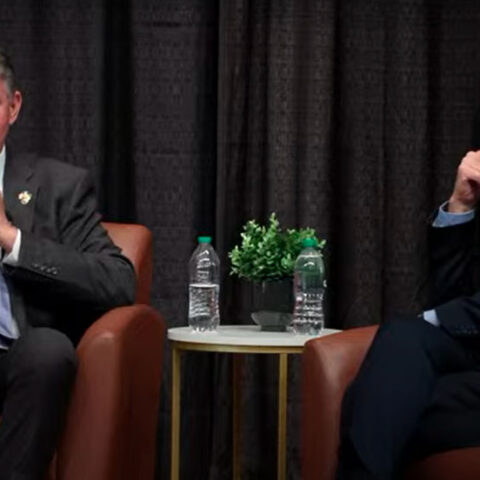By: Brian Underwood

Brian Underwood is a junior majoring in Political Science and History.
Question: Contemporary culture in America emphasizes being an individual as more important than being a citizen. Do you agree or disagree?
It is paradoxical that the United States, a nation thought to pride itself on its fierce sense of individualism, should be considered a general opponent of the individual man. Certainly this is not to say that the United States, on its whole, rejects man’s rights as an individual – at least not consistently. Nevertheless, the current cultural tenor of the United States is one which, more often than not, seeks to temper man’s liberties and interests as an individual with the constraints of social and civic “duty.”
The “individual” in this context is best understood as Marx’s egoistic man, the man “withdrawn into himself, wholly preoccupied with his own interests.”[1] Alternatively, citizens are not just legally recognized nationals, but are instead men who “come to identify themselves in some way with this larger whole [of civil society]; to feel themselves to be members of the homeland;… to elevate their soul perpetually toward this great object.”[2] Essentially, the individual serves himself while the citizen serves his country and his countrymen.
In a given society, “culture” is identified by its ideas and the persons shaping them, naturally allowing for the existence of various subcultures and countercultures depending on the scope of one’s observational lens. Here, it is the broader culture of the entire United States that is under scrutiny, rather than the culture of any subdivision of it, and so it is the preeminent ideas in America’s culture which ought to be examined.
The present culture of the United States most commonly exalts the citizen over the individual. This is especially true in America’s political culture, where these ideals are professed in their most visible and explicit forms: the rhetoric and policies of America’s political leadership. Politicians from both parties make frequent use of the phrases “common good” or “greater than ourselves” when campaigning to constituents or garnering support for their policies. “Appealing to the citizen” is certainly not a recent development in American politics, as a glancing look at the presidency of Woodrow Wilson will demonstrate (“There is no higher religion than human service. To work for the common good is the greatest creed.”).[3] Still, the preference exemplified in the political culture of the United States toward the citizen over the individual is so pervasive that one need scarcely search to find a plethora of instances in which politicians invoke the supposed virtue of service and sacrifice.
In 1995, a younger Barack Obama spoke to the Chicago Reader about the importance of participating in collective action, since “individual actions, individual dreams are not sufficient.”[4] During his famous keynote address at the 2004 Democratic National Convention, Obama praised Sen. Kerry for understanding the ideals of “community” and “service.”[5] In his 2013 State of the Union Address, President Obama stressed the importance of “giving our young and brightest minds new opportunities to serve.”[6] President Obama’s former chief of staff Rahm Emanuel echoed similar sentiments during his commencement speech at George Washington University, imploring students to give themselves “to a cause greater than” themselves and reminding them of their “great responsibility” to serve their country.[7] Similar statements by other members of the left are equally prevalent.
But again, proclamations of service and civil duty are not at all unique to the left or the Democratic Party. In a commencement address of his own to Colgate University, Sen. John McCain told students that the means they “must use to prevail” are their “good character put to the service of a cause greater than [their] self-interest.”[8] During his speech at the 2013 Conservative Political Action Conference, Fmr. Rep. Allen West stated that “conservatives believe it is our moral duty to serve our fellow man.”[9] Even University of Georgia President Adams, himself a Republican, maintained in a letter to the editor that the interests of society in providing public education take precedence over the individual’s interest in not paying taxes to fund that service, “for the good both of one and all.”[10] Again, further examples abound.
The principle disagreement between right-leaning and left-leaning appeals to service and civic duty is the form in which the service should take place. Conservatives, per Allen West’s statements, believe their service as citizens should be handled privately, while the left tends to believe it should be directed by the government. These, however, are disputes over merely concrete matters. The principle remains the same across both sides: one man putting himself into the service of something “greater than himself,” be it society, the country as a whole, or simply his fellow man. In any case, it is imperative to remember that the question at hand is not a normative one (meaning, what should American culture emphasize) but is instead an empirical one (what does it emphasize), and the most readily available information at hand lends credence to the assertion that it is not the individual which American culture generally esteems, but the citizen.
[1] Karl Marx, “On the Jewish Question,” The Marx-Engels Reader, ed. Robert C. Tucker, 2nd ed. (New York: W.W. Norton & Company, 1978), 46.
[2] Jean-Jacques Rousseau, “Political Economy,” On the Social Contract with Geneva Manuscript and Political Economy, trans. Judith R. Masters (New York: St. Martin’s Press, 1978), 108.
[3] “Woodrow Wilson Awards,” Wilson Center, http://www.wilsoncenter.org/woodrow-wilson-awards.
[4] Hank De Zutter, “What Makes Obama Run?” The Chicago Reader, December 7, 1995, http://www.chicagoreader.com/chicago/what-makes-obama-run/Content?oid=889221.
[5] Barack Obama, “Transcript: Illinois Senate Candidate Barack Obama,” The Washington Post, July 27, 2004, http://www.washingtonpost.com/wp-dyn/articles/A19751-2004Jul27.html.
[6] Barack Obama, “The 2013 State of the Union,” The White House, http://www.whitehouse.gov/state-of-the-union-2013.
[7] Sarach Scire, “Transcript of Rahm Emanuel’s Commencement Address,” The GW Hatchet, May 17, 2009, http://blogs.gwhatchet.com/newsroom/2009/05/17/transcript-of-rahm-emanuels-commencement-address/.
[8] John McCain, “Colgate University Commencement Address,” May 21, 2000, http://www.mccain.senate.gov/ public/index.cfm?FuseAction=PressOffice.Speeches&ContentRecord_id=2ceb1957-3e43-4459-a013-3aebe0a4bd2f&Region_id=&Issue_id=79a48974-2bd4-4888-be97-e8a445366a84.
[9] Sam Stein, “Allen West CPAC Speech: Former Congressman Outlines His Definition of Conservatism,” The Huffington Post, March 14, 2013, http://www.huffingtonpost.com/2013/03/14/allen-west-cpac-speech-2013_n_2870156.html.
[10] Michael F. Adams, “Mailbox: President Adams weighs in on public education argument,” The Red & Black, March 23, 2013.

